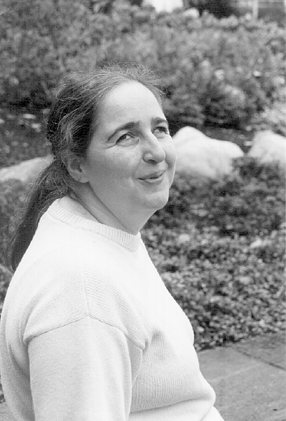 Capturing and storing information provides Rita Dilek with challenges both professional
and personal. Dilek, who graduates this month with a master's degree in Computer
Science, is blind.
Capturing and storing information provides Rita Dilek with challenges both professional
and personal. Dilek, who graduates this month with a master's degree in Computer
Science, is blind.  Capturing and storing information provides Rita Dilek with challenges both professional
and personal. Dilek, who graduates this month with a master's degree in Computer
Science, is blind.
Capturing and storing information provides Rita Dilek with challenges both professional
and personal. Dilek, who graduates this month with a master's degree in Computer
Science, is blind.
She is one of more than 2,000 UBC students graduating during Fall Congregation at the Chan Centre for the Performing Arts Nov. 26 and 27.
Her thesis examines how to provide system support where computers are handling large volumes of data generated by multimedia programs.
Originally from Turkey, Dilek learned French from her parents and Spanish from her grandparents. She studied English in high school and was fluent by the time she attended Boston's Brandeis University.
After graduating with an undergraduate degree in psychology and mathematics, she went to Harvard to obtain a master's degree in mathematics.
"I worked in the computer field for some time and I could fix many problems but I knew I'd go back to school eventually for the theoretical background," she says.
The special mathematical symbols and letters from the Greek alphabet used in mathematical formulae presented a unique challenge for Dilek. She uses an electronic device half the size of a regular computer keyboard called Braille and Speak to process information.
"This is my address book, my calendar, where I keep my class notes and edits to my thesis," says Dilek. "It allows me to be independent of a lot of things."
Dilek can hook up the machine to any computer via cable and have digital data transformed into words spoken by a computerized voice.
In lectures, she uses the machine as a transcriber by entering information using keys that represent Braille symbols. The device can either store the information on a disc or provide a Braille printout.
With some help she devised a translation system where the printed mathematical characters were read aloud using a code that the device could translate into characters of the Braille alphabet.
But even with these significant practical challenges, Dilek says her greatest struggle was returning to school after her studies were disrupted for almost a year due to health problems and a death in the family.
"It was a big decision psychologically," she says. "Recapturing the work and reviewing everything was a huge task."
The words, pictures and sounds that make up multimedia programs require a lot of computer resources such as memory and storage space. The problem is worsened where there are a large number of individuals using multimedia programs at the same time.
Computers can be programmed to compress large volumes of data to create space for more information. The older methods of compression use a fixed rate for reducing bytes.
The volume of data becomes unwieldy, however, where there are many users such as an entire department or organization using multimedia applications. Despite the compression, the system may become too overloaded to provide an acceptable level of quality for users.
A newer and more efficient technique is to use variable rate compression, which saves much more computer space and allows more users to access the system.
"Variable rate is harder on the system, though, and bottlenecks can occur because resources are not being consumed at a uniform rate," says Dilek. "The problem is predicting when and where the bottlenecks will occur."
By developing statistical algorithms, Dilek was able to predict the resource needs for users.
"I was able to apply my theoretical understanding of mathematics to formulate how much space is required at any given time to accommodate the volume of data," she says.
Now that her thesis is completed, Dilek is looking forward to picking up some of her extra-curricular activities. She enjoys listening to and performing choral music. She has also started writing a novel set in the late 18th century.
After graduation, Dilek plans to pursue computer systems work.